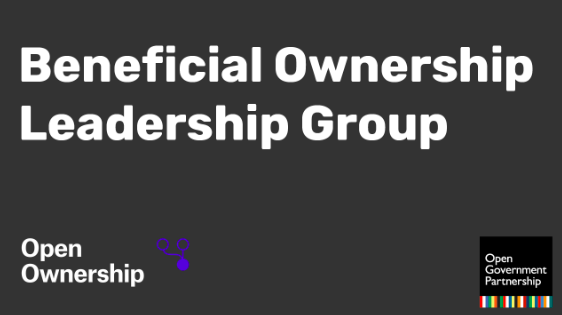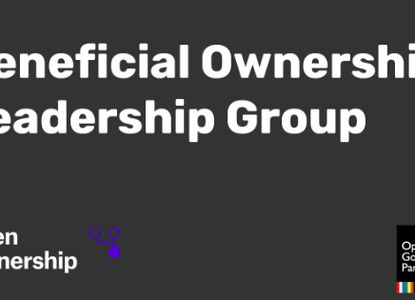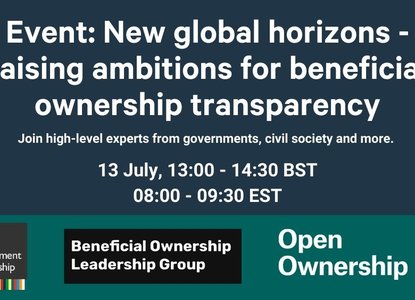Sharing experiences: December’s Leadership Group technical discussion on legislation and verification

On 1 December, the Beneficial Ownership Leadership Group held its latest technical meeting. Held around twice a year, these virtual meetings provide a space for government officials at the frontline of reform to meet peers from around the world, discuss challenges, and share experiences.
Discussions are held under the Chatham House Rule to enable participants to share openly. In addition to representatives from Leadership Group member countries, the meeting was also open to observer countries that are actively working through implementation of reforms, with just over 50 attendees in total.
On the agenda were two complex implementation issues that many countries within and beyond the Leadership Group are addressing: legislating for effective reforms, and verifying beneficial ownership information.
Legislating effectively for beneficial ownership reforms
The first half of the meeting explored the theme of legislating effectively for beneficial ownership reforms, with discussion facilitated by Favour Ime, Open Ownership’s Regional Manager for Africa who was formerly a practicing lawyer in Nigeria.
Government representatives discussed the benefits and challenges of drafting legislation swiftly in response to political urgency to advance reforms, when there may not be much time to connect with peers and understand their approach, and how it is working. There were exchanges between countries that are developing innovative approaches to sanctions, for example targeting entities and persons with sufficient connection to a jurisdiction, to ensure that the sanctions that are put into law are enforceable in practice.
The issue of balancing privacy and public access to beneficial ownership information came up in detailed exchanges about issues such as determining thresholds. However, despite the ruling of the European Court of Justice on the EU’s approach to public beneficial ownership registers having been published just one week before the meeting, most countries represented were from outside the EU, and there was a clear sense that work continues apace to legislate for public registers.
Verification of beneficial ownership information
The second half of the meeting turned to verifying beneficial ownership information. Given the requirement in the revised Financial Action Task Force (FATF) Recommendation 24 to verify the identity of beneficial owners and their status as a beneficial owner, countries within and beyond the Leadership Group were keen to share their existing verification practices, and hear from others regarding how they are planning to strengthen their practices in light of the new FATF requirements.
Participants shared several examples of the verification mechanisms they have in operation, and discussions highlighted the relative ease that many encounter when verifying the identity of beneficial owners who are domestic citizens. Ideas and proposals were exchanged on the more difficult issue of verifying the identity of foreign nationals.
Ensuring that political commitments drive concrete implementation
For Open Ownership, the technical meetings of the Leadership Group are always a rich source of discussion about the detailed implementation issues we work on daily. In addition to the main objective of enabling countries to share their experiences and learn from one another, this meeting proved a useful opportunity to identify salient topics that merit further technical discussion. Some participants shared that they are working through challenging questions regarding how to deal with trusts that appear in company ownership chains, and Open Ownership is considering a further event to discuss these issues in more detail in the New Year.
Technical fora such as this provide a necessary underpinning to the growing political commitments on beneficial ownership transparency made through the Open Government Partnership and fora such as the Summit for Democracy. In the run-up to the second Summit for Democracy in March 2023, we’ll continue to work with Open Government Partnership as co-conveners of the Leadership Group to leverage the connections between these initiatives and ensure that political commitments can drive concrete implementation.
Related articles and publications
Publication type
Blog post
Sections
Impact,
Implementation

